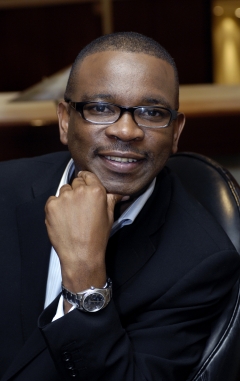2016 Harry Oppenheimer Fellow named


Established by the trustees of the Oppenheimer Memorial Trust, the Harry Oppenheimer Fellowship Award is made to leading scholars who demonstrate a record of outstanding research and intellectual achievement. In addition, recipients must demonstrate a capacity and commitment to transferring knowledge to their fellow citizens. The award of the gold medal and a monetary prize is bestowed by the chairperson of the Trust, Nicky Oppenheimer. Previous UCT recipients include: Professor Keertan Dheda (2013); Professor Les Underhill (2011); Professor Jill Farrant (2009); Emeritus Professor Philippe-Joseph Salazar (2008); jointly to Professor Igor Barashenkov and Professor Frank Bombacher (2005). Mangcu will take up his fellowship at the Hutchins Centre for African and African American Research at Harvard University later this year.
He is no stranger to accolades having co-authored nine books and published widely in a number of academic publications including the DuBois Review; Interventions: The Journal of Post-Colonial Theory (edited by the distinguished Robert Youung); The Good Society and Transition Magazine and Development, the flagship journal of the Society for International Development; the upcoming special issue of The Critical Philosophy of Race edited by the distinguished philosopher, Robert Bernasconi. He has previously been a fellow at global think tank The Brookings Institution and a Warren Weaver Fellow at the Rockefeller Foundation in New York. He was also a fellow at the John F. Kennedy School of Government at Harvard and the recipient of Harvard’s Oppenheimer Fellowship, which is awarded to distinguished African scholars. In 2014 Mangcu became the third person to receive that honour from Harvard, after the distinguished academics Charles van Onselen and Achille Mbembe. In addition, Mangcu has been a fellow at the Massachusetts Institute of Technology and at Cornell University where he obtained his PhD in City and Regional Planning. He holds both a Masters degree in Development Planning and a Bachelor of Arts degree (Sociology) from the University of the Witwatersrand.
The Harry Oppenheimer Fellowship will enable Mangcu to continue his research on Nelson Mandela culminating in the publication of a new book to be titled Nelson Mandela: Romantic Hero, Tragic Hero. He has taken sabbatical in order to complete both the research and the book which according to Mangcu, will constitute the first Black authored biography of Mandela and one of the first to locate the struggle icon within a broader history of Black political and intellectual thought, going back to the 19th century. The focus of his research at Harvard will be ‘a critique of the individualistic conception of the hero’ informed by the medieval, renaissance and romantic reconceptualization of the tragic hero. “I go back to Greek and African Tragedy where the hero is not the entirety of the action but a part of a broader communal experience, so that even when the hero is dead, the tragic action continues through the chorus and the audience. As Raymond Williams put it, what matters is not so much what happens to the hero but what happens through the hero,” he says.
His research interests include African intellectual history and biography, comparative race studies and transformation of higher education in South Africa. He argues that the work of black intellectuals such as Tiyo Soga, S.E.K Mqhayi and Steve Biko should be brought into the canon of sociology. “Their writings on culture, identity, religion and language are crucial to the kind of society we are seeking to become. Decolonization is not running after Frantz Fanon but a digging up of the extensive oeuvre of African intellectual writing in this country,” says Mangcu. His latest work aims to provide a different perspective on Mandela locating him within this broader context of black political history and scholarship. He says that he hopes to complete the book in time for the centenary celebration of Madiba’s birthday. “I am proud of the international recognition and accolades that I continue to receive,” says Mangcu. “This Fellowship award comes at a crucial moment in the history of the country, when black academics are asserting that their talents and accomplishments will not be denied. I hope to finish the book in time for Madiba's 100th birthday in 2018, provided that it does not take me on detours that I have not yet anticipated, which is quite common with any project of biography,” he says.
Mangcu enjoys a full teaching load at UCT, teaching undergraduate courses in social theory and culture and social life in the 21st century, an honours-level course on the sociology of development as well as a Master’s level social theory course. He currently supervises a number of postgraduate students including PhD students.